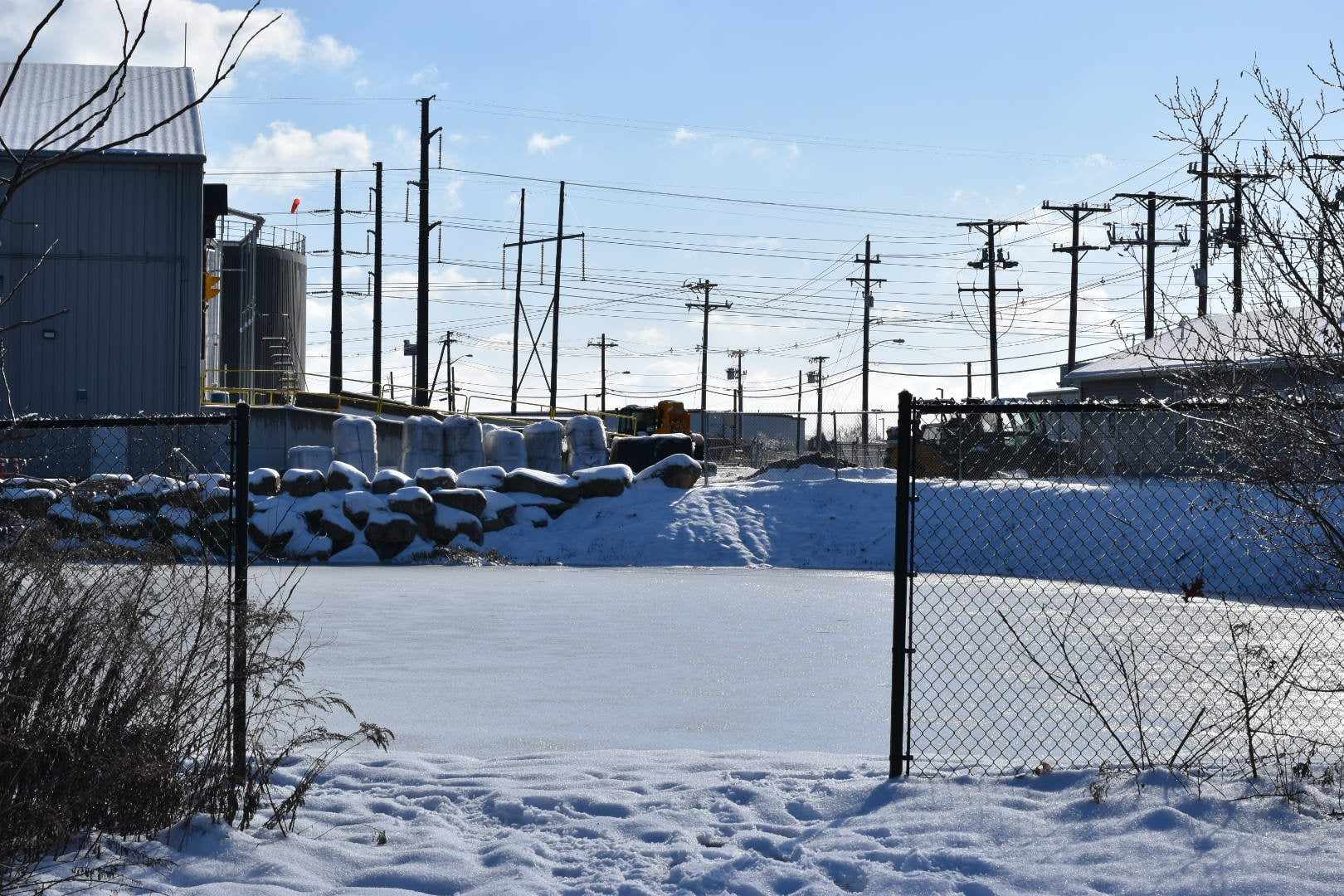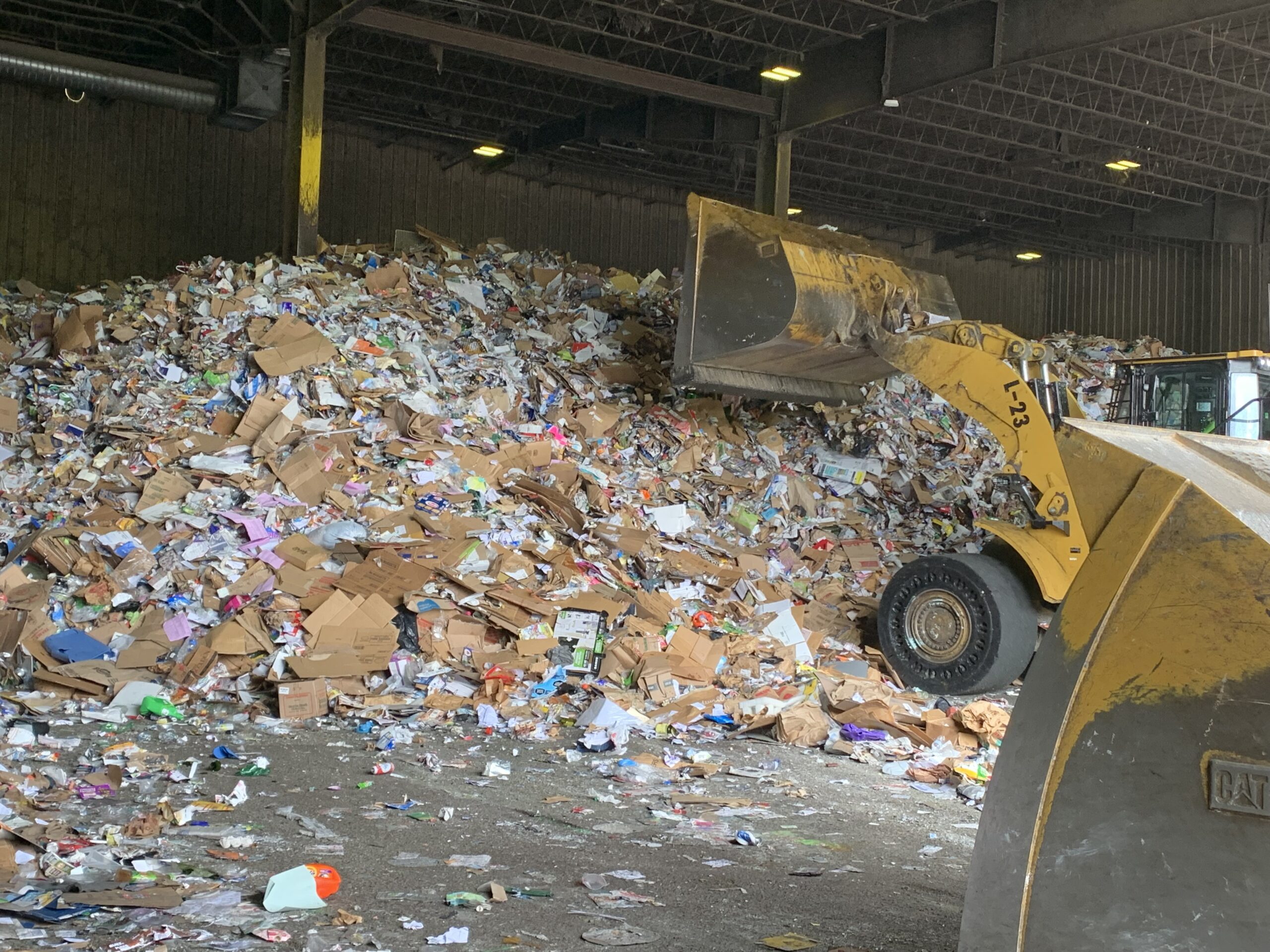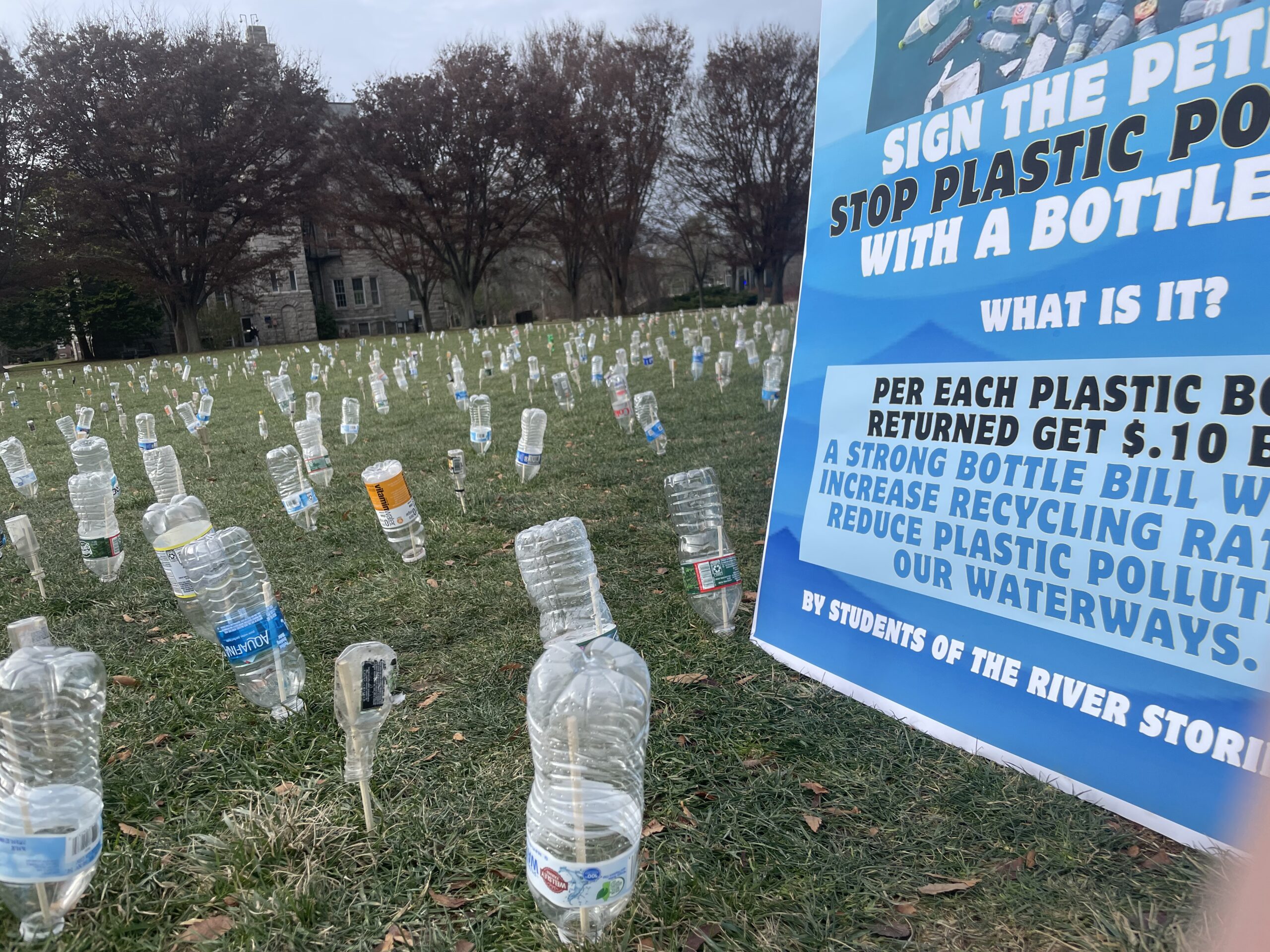Bioplastics Get Trashed in Rhode Island
June 3, 2012
Maybe you’ve seen them in the supermarket. Or maybe you’ve seen the ads. Maybe you were skeptical. Or maybe you thought, Cool!
We’re talking about plastic bottles that are made from plants. Dasani’s PlantBottle is one.
The claim on the bottle and on Dasani’s website, which shows an image of a water bottle emerging from a dew-flecked green leaf, is that its plant-based PET (polyethylene terephthalate) bottles are made from up to 30 percent plants and are 100 percent recyclable.
But buyers of Rhode Island’s post-consumer plastic consider plant-based PET plastic to be a contaminant, according to Sarah Kite, director of recycling services for the Rhode Island Resource Recovery Corporation (RIRRC).
“Until they (our buyers) tell us that plant-based plastics are OK, we have to say that they are not recyclable in Rhode Island,” Kite said.
For now at least, the place for Rhode Islanders to put these bottles is in the trash, not the recycling bin.
Perplexed that Dasani’s marketing claims weren’t matching up to reality, ecoRI News contacted Steve Alexander at the Association of Postconsumer Plastic Recyclers (APPR), a national trade association representing companies who acquire, reprocess and sell more than 90 percent of the post-consumer plastic in North America.
Alexander, who said APPR worked with Coca-Cola, Dasani’s parent company, to design the PlantBottle to meet current recycling specifications, was blunt when told that RIRRC’s customers consider PET made from plants to be a contaminant. “You’ve gotten some bad information,” he said.
“These bottles are the same as other PET bottles and can be recycled as PET,” Alexander said. “If it has the same molecular components, it is recyclable.”
To make sure the facts were right, ecoRI News contacted its science expert and composting guru, Michael Bradlee, founder of Earth Appliance. He backed up Alexander’s claim.
“Purified chemicals do not retain any memory of their origin; monoethylene glycol (MEG), one of the components in PET, derrived from petrolium is absolutely identical and cannot be distinguished from plant-based MEG,” Bradlee said.
ecoRI News went back to Kite, who stood by her earlier statement that plant-based PET is not accepted by RIRRC customers at this time.
And so, with Rhode Island rolling out its new single-stream recycling system this week, a system that aims to simplify recycling for residents and calls on them to put all plastic containers of 2 gallons or less in their recycling bin, we already have an exception to that rule. Actually, we have a few, all of them bioplastics.
PET plastic made from plants, along with PLA plastics and biodegradable plastics, are all considered trash in Rhode Island, at least for now.
Head spinning yet? Welcome to the complex world of bioplastics.
What is this stuff?
Bioplastics have been around since the 1950s, but with awareness growing as to the scourge of traditional fossil fuel-intensive plastics and with the cost of petroleum on the rise, companies such as Coca-Cola and Pepsi are looking for alternative ways to create plastics and, parenthetically, a marketing buzz.
Because they rely less on greenhouse-gas emitting fossil fuel and more on renewable plant-based sources, bioplasics are generally considered to be more sustainable than traditional plastics.
A bioplastic can have one or all of the following attributes: bio-based (made from plants), biodegradable and/or compostable.
Currently, bioplastics represent less than 1 percent of all plastics on the market today, but you can expect that percentage to increase as new innovations come online and as more companies adopt bioplastic packaging.
Bioplastics can be a PET (or an HDPE)
The Dasani bottles mentioned above are PET bottles. PET is made up of two components: monoethylene glycol (MEG) and terephthalate. MEG accounts for 30 percent of the weight of PET and this is what Coca-Cola, with its PlantBottle, is producing from plant sources, such as sugarcane grown in Brazil.
Historically, MEG was created using petroleum.
Odwalla, the smoothie-producing subsidiary of Coca-Cola, now sells its drinks in an HDPE, or high-density polyethylene, plastic bottle made almost entirely (at least 96 percent) from molasses and sugarcane.
Though the raw materials for plant-based PET and HDPE come from renewable, lower-carbon sources, the resulting plastics are chemically identical to traditional plastic bottles. And, as plastic, the plant-based bottles carry all the same environmental impacts as those made from fossil fuels, and they don’t biodegrade.
So, are they better for the environment? That is a complicated question and one that depends on how the plants used to make the plastic are grown: Are they grown with petrochemicals? Are they produced from GMOs? And so much depends on the afterlife of the bottle — in Rhode Island plant-based PET (and HDPE) bottles go in the trash.
Even in states or municipalities that do recycle these bottles, manufacturers typically peg the recycling rate for PET at 27 percent. And so, even if a PET bottle made from plants isn’t front loaded with carbon, it could still wind up in a landfill, or, worse, in the ocean, where it will pollute just as a traditional plastic bottle would.
Communication breakdown
Biodegradable plastic, a plastic that can be plant or petroleum based, is appealing to consumers because there is the promise that the bottle they’ve just purchased will — Presto! — disappear.
ENSO Plastics, an Arizona-based company that produces one such biodegradable plastic bottle, claims that its bottles are biodegradable in both landfill and compost environments. The company creates material for its bottles by injecting the polymers that make up plastic with additives that attract microbes, which, in turn, break down the plastic.
But not much breaks down in a landfill, which lacks oxygen. And, even if biodegradable plastics do break down in this oxygen-free environment, they emit methane, a greenhouse gas 23 times more potent than carbon dioxide.
To properly degrade, biodegradable plastics need to be sent to a commercial composting or anaerobic facility. But, most places, Rhode Island included, lack such facilities. Because of the biodegradable additives, these plastics are universally considered to be a contaminant among recyclers.
“It is difficult to impossible in some cases to properly identify the plastics with the additives,” Kite said. “This means that all the selected plastics are sent to the remanufacturer. The plastics with additives are reblended into the new plastic, compromising the plastic’s integrity.”
There also is concern, among environmental groups, that biodegradable plastics may actually encourage litter and increase consumption if people think that these plastics will degrade.
PLA it forward
You’ve perhaps seen compostable plastic at eco-minded cafés, where compostable to-go cups are used for iced coffee or other cold drinks.
These cups are made from PLA, or polylactic acid. Producing PLA uses 65 percent less energy than producing conventional plastics, according to an independent analysis commissioned by NatureWorks, the Cargill-owned company that produces PLA from corn.
PLA is said to decompose into carbon dioxide and water in a “controlled composting environment” in fewer than 90 days. A controlled environment is a large facility where compost reaches 140 degrees for 10 consecutive days.
But again, here in Rhode Island, residents have no access to commercial-scale composting, and so the promises of compostable plastic breaking down are fleeting. Instead, these plastic bottles are either erroneously put in the recycling bin, where they are considered a contaminant, or tossed into the trash and ultimately buried in the landfill, where they will not break down at all.
“Here at our MRF (materials recovery facility), we are unable to sort for PLA or bioplastics, just as no other MRF is able to do,” Kite said. “Keep in mind how biodegradable works: You need the proper conditions for materials to break down (air, light, water), and in a sanitary landfill, those conditions do not exist. Compostable plastics need to be composted in a commercial composter, which doesn’t exist in Rhode Island.”
Is there a great future in bioplastics?
The marketing claims on bioplastics ring hollow in Rhode Island. And all the green ad-speak hoodwinks uninformed consumers into thinking they are being environmentally responsible by purchasing these materials.
For now, bioplastics in the Ocean State, be they compostable, biodegradable, recyclable or all three, are considered trash. But this could change if the market shifts to accept bio-based PET or if Rhode Island gets a large-scale composting facility. If these “ifs” come to fruition in Rhode Island and elsewhere, bioplastics might offer some solutions to the scourge of plastic waste.
Athena Lee Bradley, projects manager at Northeast Recycling Council Inc., a multi-state organization committed to responsible solid waste management, is skeptical of bioplastics. “There has not been enough research done to know what kind of an impact these bottles will have on the recycling stream, so any company marketing and selling the bottles, is in my opinion, being irresponsible,” she said.
Categories
Join the Discussion
View CommentsRecent Comments
Leave a Reply
Your support keeps our reporters on the environmental beat.
Reader support is at the core of our nonprofit news model. Together, we can keep the environment in the headlines.
We use cookies to improve your experience and deliver personalized content. View Cookie Settings




This article should be a bit embarrasing to Sarah Kite and the author. A bit of research would answer the questions to the mis-information that they are working with. To have a recycler not understand the different plastic technology is a shock.
I'm hopeful that ALL recyclers do not share Sarah's ignorance or approach. Recycling should be about developing and finding new markets to take any kind of material, NOT sit back and only take what can easily be sold. Most plastics are recyclable and have a market value and to address our global environmental issue surrounding plastics we need recyclers to be part of the solution by helping to find and develop new markets for the materials! NOT take the approach Sarah Kite is suggesting of rejecting any new technologies that help us move towards better solutions!! Be part of the solution, NOT the problem!!!
It's also clear from this article that NO research went into answering the questions posed. How does Sarah reject the information that APR provided indicating that the plant bottle is fully recycable? How come no infomraiton was provided by the author on the realities regarding the appraoch and technologies such as ENSO Plastics who was mentioned in the article?
This is an example of bad information being propigated by bad journalism….
Steve, thank you for taking the time to comment on the ecoRI News bioplastics story. We encourage community discussion.
However, I take offense to your calling the well-researched piece bad journalism. The questions posed by the author are legitimate concerns, especially here in Rhode Island, where we were told these bioplastics aren’t recycled because Rhode Island Resource Recovery Corporation vendors won’t take them for fear of contamination.
If you could provide some examples you consider bad journalism, I would be happy to respond to each. Just because you believe RIRRC is “ignorant” when it comes to bioplastics, especially plant-based PET plastics, doesn’t qualify the story as bad journalism. We are reporting what local recycling officials are telling us and how these plastics are dealt with in Rhode Island. Some bioplastics, according to RIRRC officials, are being recycled and we have no large-scale composting facility to compost others. That's a fact. That doesn't mean these new types of plastics are bad, but it does allow for questions to be posed and information shared.
Again, I would be happy to discuss our “bad journalism” if you could provide specific examples.
— Frank Carini, ecoRI News executive director
The information the RIRRC is working with is not entirely accurate. As the President of ENSO Plastics I would like to make myself and company available to provide information and research data to the RIRRC so that they have more valid information to make their decision on.
We do NOT claim that plastics enhanced with ENSO biodegradable additives are compostable! Plastics enhanced with the ENSO additive is biodegradable in anaerobic environments such as found in landfills. Plastics enhanced with our additive are also fully recyclable and do NOT contaminate the recycle stream. When it comes to the recyclability of plastics enhanced with the ENSO additive it is not much different than adding in a colorant – our material is inert.
I'd encourage anyone to learn more at our website or call to get the full picture of what the ENSO technologies can and cannot do. We are facing a global plastic pollution issue and ENSO Plastics was created to help solve this problem. It's going to take all of us working together to make a difference and the best way we can do that is by having the most accurate information.
Sincerely,
Danny Clark
President
ENSO Plastics
I've complained to the Bon Appetit folks at Roger Williams Univ, who carefully label all their plastic containers for yogurt, salads, etc. as "compostable" but have confirmed that there is no way to actually get them into a composting stream. I've tried putting them in my home compost and two years later they're still there. So it's just greenwashing, which probably costs more for no actual benefit. This is the kind of thing that makes people cynical. I hope RIRRC will reconsider its policy as it's really complicated to keep track of the exceptions to the "everything in the bin" rule.
Providence was recently rated the #2 city in the country for clean drinking water. If you live here, pick up a reusable bottle. It won't solve all of our plastic problems, but it will help.
The commenters referring to ENSO Plastics appear to be advertising rather than contributing to a healthy dialogue. ecoRI reported the facts and information they received in a concise, well-structured way and this is a fantastic article whose merit should not be based on the potential misinformation of interview subjects. I applaud ecoRI for another fantastic article!